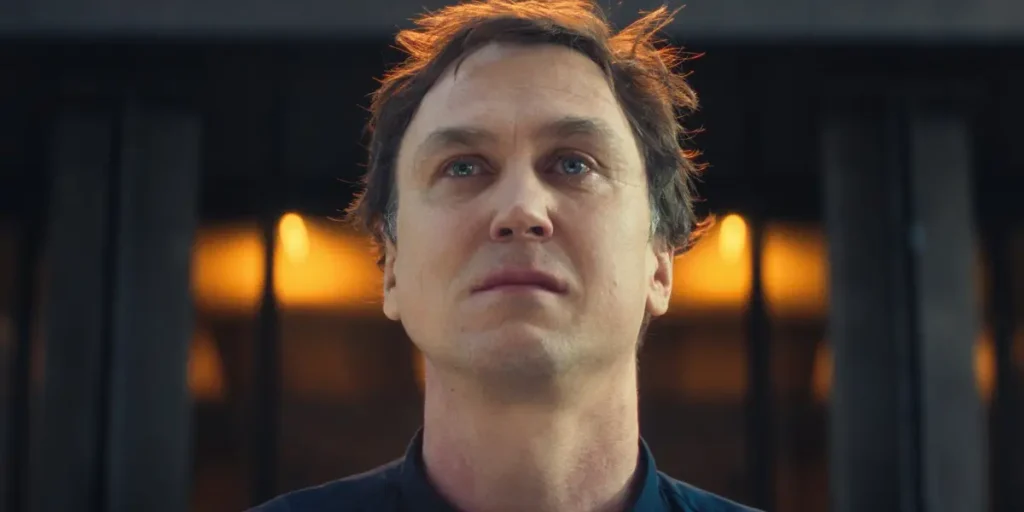Dying, a complex and confident tale of a family grappling with death in all its forms, sees writer-director Matthias Glasner working at the peak of his powers.
Writer & Director: Matthias Glasner
Genres: Drama, Dark Comedy
Run Time: 180′
U.K. & Ireland Release: July 25, 2025
U.S. Release: TBA
Where to Watch: In Uk & Irish cinemas
To paraphrase Homer Simpson, what’s with all the death? This year’s cinematic offerings are preoccupied with the ever-extended reach of the Reaper. If it’s not 28 Years Later or the latest instalment of Final Destination reflecting on our relationship with death, then auteurs like David Cronenberg and Wes Anderson are paranoically considering their legacies. Dying (Sterben) is different; it doesn’t view the inevitability of our passing through the lens of metaphor. Its characters stare death down directly, confronting it in dramatic but painfully honest ways.
Death comes quickly at the end, but Dying takes its time. Writer-director Matthias Glasner is not one to shy away from a long film (A number of his previous movies run well over 2.5 hours), but Dying doesn’t linger for the sake of it. Its three-hour runtime is generous but necessary, as four members of a family see death manifesting in themselves and in each other. Some are trying to live with it, others are trying to outrun it, but few of them can understand it. This is universal; death comes for us all, no matter what we do. Glasner does an admirable job of demonstrating how very different people, despite being related, deal with the inevitable.
Dying is divided into several parts, with the first act focused on Lisey (Corinna Harfouch), the beleaguered but resolute matriarch of the Lunies family. Despite age-related maladies of her own, she’s tasked with the care of her husband Gerd (Hans-Uwe Bauer), whose dementia leads him to wander. Carers will tell you such mental degeneration is a double death, watching the poor soul ebb away mentally long before the body catches up. Glasner’s meticulous script and observant eye capture Lisey’s efforts to maintain her and her husband’s dignity in all their painful reality. Slow death like this freezes both the sufferer and the people around them in place. This is reflected in their unostentatious home, and in DoP Jakub Bejnarowicz’s muted colours.

As heartbreaking as this story can be (See Florian Zeller’s stunning The Father as proof), Glasner has other death knells to listen out for. Where Lisey’s life is stuck, that of her son Tom (Lars Eidinger) is racing ahead. A conductor in Berlin, he attempts to bring his colleague Bernard’s (Robert Gwisdek) new work (entitled ‘Dying’) to a live audience, if only Bernard would stop tinkering with it. While these men’s inability to decide how ‘Dying’ should work is an obvious metaphor, Glasner’s script offers both time and complexity to ensure their choices are not so simple. As Tom attempts to balance his current relationship with Ronja (Saskia Rosendahl) with his attempts to act as father to his ex Liv’s (Anna Bederke) new baby, it’s clear that neither living nor dying is straightforward.
Dying stretches its thematic remit to examine deaths of all kinds, not just physical. Between its various characters, many things are dying: relationships, careers, even hope itself. In Glasner’s worldview, though, drawing close to the end drives those who bear witness to it to drastic actions, and Glasner lets everyone get their frustrations off their chest. When Tom receives a call from his estranged mother to tell him his father isn’t well, and their disparate worlds start to intertwine, the complexities of the script compel the actors to find remarkable emotional depths.
Tom returns home, only for bitternesses and revelations to bubble up from below the surface-level politesse. Lissy explains her coldness towards her son, even when both need support as they watch Gerd become more ill. Glasner’s insightful writing could become cruel in the hands of lesser actors, but Harfouch and Eidinger crack and betray their characters’ true feelings beautifully.
The sprawling runtime, multiple narrative strands and broken families of Dying have earned it comparisons to Magnolia. Glasner’s film isn’t as uniquely operatic as Paul Thomas Anderson’s opus, but they share a wide view of various havocs coming together to make some kind of sense by the end. While Tom and Lissy grapple with the emotional fallout of Gerd’s incoming passing, their sister/daughter Ellen (Lilith Stangenberg) is hundreds of miles away, using alcohol and hedonism to cope with her demons. Her literal distance from her perturbed family might not save her from their woes, but it does allow Glasner to inject some humour and even farce into proceedings.
Dying grapples with any number of hot button topics (Broken families, suicide, etc.), but it rarely becomes too dour. It remains steadfast in confronting these issues with honest emotions, and that sometimes entails laughing when things lapse into absurdity. When an allergic reaction or a disastrous karaoke session breaks your stride, sometimes all you can do is laugh. Stangenberg commits to Glasner’s sense of humour, keeping pace with her co-stars in bringing out the desired emotions.
The comings and goings of the various plots keep Dying from ever feeling stretched out. It earns its runtime and uses it wisely, building to emotional crescendoes in each act, before wrapping up on a pragmatic note. Dying knows death is on our minds, and allows those thoughts to run riot. However we approach that morbid topic, it’s good to know that plenty of people are struggling with it too, and that’s perfectly OK.
Dying (Sterben): Movie Plot & Recap
Synopsis:
The various members of a German family reluctantly reunite to confront the various brushes with death that await them.
Pros:
- Glasner’s emotionally intelligent and confident script
- Terrific performances across the board
- Universal anxieties about death are ably conveyed
Cons:
- The three-hour runtime may put some people off
Dying (Sterben) will be released in UK & Irish cinemas from July 25, 2025.

